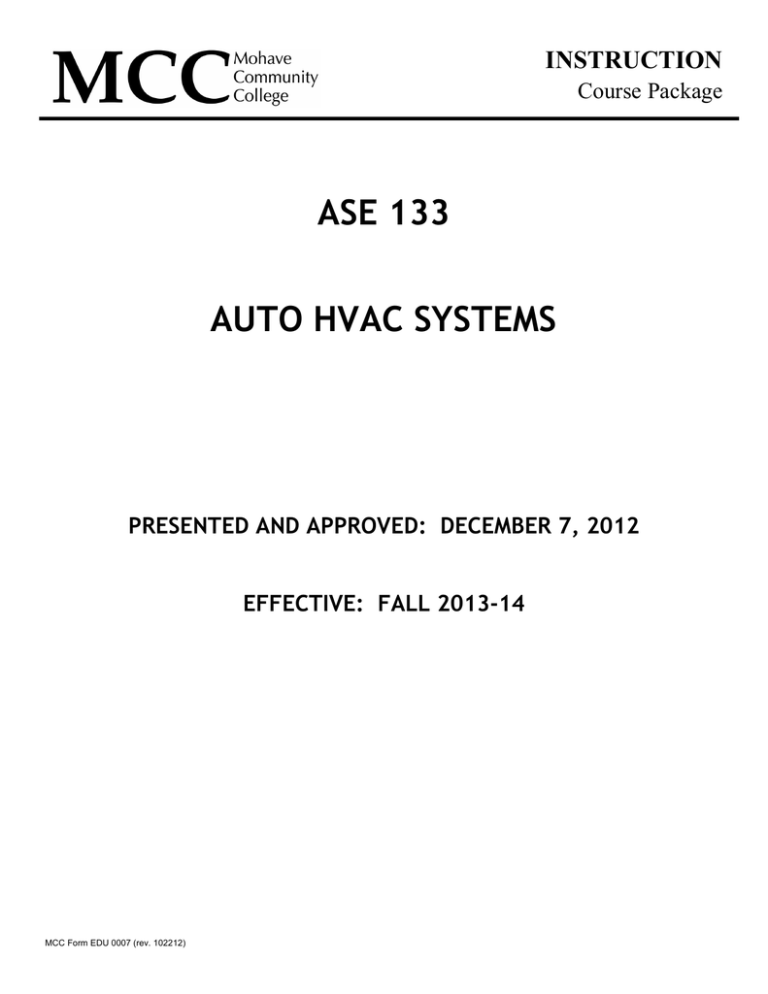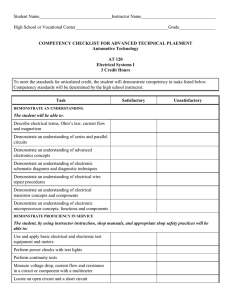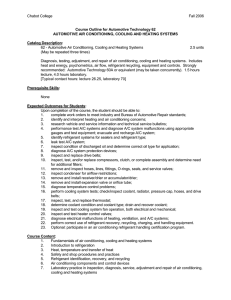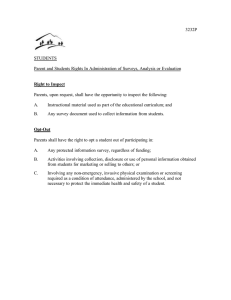
INSTRUCTION
Course Package
ASE 133
AUTO HVAC SYSTEMS
PRESENTED AND APPROVED: DECEMBER 7, 2012
EFFECTIVE: FALL 2013-14
MCC Form EDU 0007 (rev. 102212)
INSTRUCTION
Course Package
Prefix & Number ASE 133
Purpose of this submission:
If this is a change, what is being changed?
(Check all that apply)
Course Title: Auto HVAC Systems
New
Change/Updated
Retire
Update Prefix
Course Description
Title
Course Number
Format Change
Credits
Prerequisite
Competencies
Textbook/Reviewed Competencies-no changes
needed
Does this course require additional fees?
No
Yes If so, please explain. Material Fees
Is there a similar course in the course bank?
No
Yes (Please identify)
Articulation: Is this course or an equivalent offered at other two and four-year universities in Arizona?
No
Yes (Identify the college, subject, prefix, number and title:
Is this course identified as a Writing Across the Curriculum course?
No
Yes
Course Assessments
Description of Possible Course Assessments (Essays, multiple
choice, etc.)
Exams standardized for this course?
Midterm
Final
Other (Please specify):
Where can faculty members locate or access the required
standardized exams for this course? (Contact Person and Location)
Example: NCK – Academic Chair Office
The course will use various chapter quizzes,
exams, and short writing assignments to assess
the student’s comprehension of course material.
Are exams required by the department?
No
Yes
If Yes, please specify:
Student Outcomes: Identify the general education goals for student
learning that is a component of this course.
Check all that apply:
1. Communicate effectively.
a. Read and comprehend at a college level.
b. Write effectively in a college setting.
2. Demonstrate effective quantitative reasoning and problem
solving skills.
3. Demonstrate effective qualitative reasoning skills.
4. Apply effective methods of inquiry.
a. Generate research paper by gathering information
MCC Form EDU 0007 (rev. 102212)
Method of Assessment
Students will be required to read and analyze
course material and case scenarios of related
automotive issues. Students must demonstrate
comprehension of material by participating in
class discussions and labs.
Students will demonstrate effective reasoning
skills through discussion of course material and
various writing assignments.
Students will build on prior week’s lessons by
determining the appropriate solutions to given
situations or scenarios. Students must
demonstrate qualitative reasoning skills through
successful completion of weekly quizzes, skills
assessments, class discussions, and written
exams.
Students will research and prepare written
report(s) regarding a related topic(s) approved by
INSTRUCTION
Course Package
from varied sources, analyzing data and organizing
information into a coherent structure.
b. Employ the scientific method.
5. Demonstrate sensitivity to diversity
a. Experience the creative products of humanity.
b. Describe alternate historical, cultural, global
perspectives.
Office of Instruction Use only:
CIP Code:
ONET Code:
Minimum Qualifications:
MCC Form EDU 0007 (rev. 102212)
the instructor.
INSTRUCTION
Course Package
COURSE INFORMATION
Initiator: Thomas Finneran
Date of proposal to Curriculum Committee: 12/07/12
Effective Semester/Year
Fall 2013
Spring
Summer
Prefix & Number: ASE 133
Full Title: (100 character limit)
Auto HVAC Systems
Short Title: (30 character limit)
Auto HVAC
Catalog Course Description: Service, operation, diagnosis and repair of automotive heating and air
conditioning system components, including automatic temperature control systems and three-phase
AC compressors. All refrigerant types are covered. Emphasis is placed on service and troubleshooting.
SUN Course Number:
Credit Hours: 4
Lecture Hours: 3
Lab Hours: 3
Prerequisite(s) Successful completion of ASE 100
Co-requisite(s) None
Intended Course Goals
By the end of the semester, students will be able to:
1. Identify refrigerant types and test for contamination and sealants.
2. Obtain EPA refrigerant recycling and service procedures license.
3. Diagnose and repair malfunctions in compressors, metering system, and controls.
4. Perform air conditioning system service procedures.
5. Properly identify and service three-phase air conditioning compressors.
6. Identify, diagnose, service, and repair heating systems.
7. Identify, diagnose, service, and repair engine cooling systems.
MCC Form EDU 0007 (rev. 102212)
INSTRUCTION
Course Package
Course Competencies and Objectives
By the end of the semester, students will be able to:
Competency 1 Identify refrigerant types, test for contamination and sealants.
Objective 1.1 Diagnose system conditions that cause protections devices to interrupt system operation.
Objective 1.2 Inspect A/C compressor drive belt(s).
Objective 1.3 Inspect, test and service A/C compressor clutch components.
Objective 1.4 Remove and reinstall A/C compressor and mountings.
Objective 1.5 Inspect oil levels for proper measurements.
Competency 2 Obtain Environmental Protection Agency (EPA) refrigerant recycling and service procedures license.
Objective 2.1 Properly use and maintain refrigerant handling equipment.
Objective 2.2 Identify and recover A/C system refrigerant.
Objective 2.3 Recycle refrigerants according to EPA standards.
Objective 2.4 Label and prepare refrigerant for storage.
Objective 2.5 Evacuate A/C systems.
Objective 2.6 Inspect/adjust system lubricant.
Objective 2.7 Charge A/C systems in accordance to service information.
Competency 3 Diagnose and repair malfunctions in compressors, metering systems, and controls.
Objective 3.1 Determine need for additional A/C system filter.
Objective 3.2 Remove and inspect A/C system hoses, lines, fittings, O-rings, seals ,and related components.
Objective 3.3 Inspect A/C condensers for airflow restrictions.
Objective 3.4 Remove and reinstall receiver driers or accumulators.
Objective 3.4 Inspect/adjust oil on receiver driers or accumulators.
Objective 3.5 Remove and install expansion valve or fixed orifice tube.
Objective 3.6 Remove and reinstall evaporator.
Objective 3.6 Inspect/adjust oil on evaporator.
Objective 3.7 Remove and reinstall condenser.
Objective 3.8 Inspect/adjust oil on condenser.
Competency 4 Perform air conditioning system service procedures.
Objective 4.3 Diagnose malfunctions in electrical controls of heating, ventilation, and air conditioning (HVAC) systems.
Objective 4.4 Diagnose control components of the HVAC system.
Objective 4.5 Diagnose and test heater control panel assembly
Objective 4.6 Inspect HVAC control cables/linkages
Objective 4.7 Inspect HVAC doors, hoses, cabin filters and outlets
Objective 4.8 Verify operation of automatic and manual HVAC control systems
Competency 5 Identify, diagnose, service, and repair three-phase air conditioning compressors.
Objective 5.1 Summarize the function of a three-phase air conditioning compressor.
Objective 5.2 Diagnose a three-phase air conditioning compressor.
Objective 5.3 Repair a three-phase air conditioning compressor.
Competency 6 Identify, diagnose, service, and repair heating systems.
Objective 6.1 Summarize the function of a heating system.
Objective 6.2 Diagnose a heating system.
Objective 6.3 Repair a heating system.
Competency 7 Identify, diagnose, service, and repair engine cooling systems.
Objective 7.1 Summarize the function of engine cooling systems.
Objective 7.2 Diagnose an engine cooling system.
Objective 7.3 Repair an engine cooling system.
MCC Form EDU 0007 (rev. 102212)
INSTRUCTION
Course Package
Current Course Textbook, Materials and Equipment
Current
Textbook(s)
Current
edition
Title
Author(s)
Publisher
ISBN#
Automotive Technology: A Systems Approach (5th edition)
Jack Erjavec
Thomson Delmar Learning
1-4018-7571-8
Title
Author(s)
Publisher
ISBN#
Software/
Equipment
PROPOSED New Course Textbook, Materials and Equipment
Effective Semester/Year
Textbook(s)
Title
Current
edition
Author(s)
Publisher
ISBN #
Title
Author(s)
Publisher
ISBN #
Software/
Equipment
MCC Form EDU 0007 (rev. 102212)
Fall
Spring
Summer
Automotive Technology: Principles, Diagnosis, and Service
(4th edition)
James D. Halderman
Pearson: Prentice Hall
139780132542616




